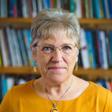Veronica Zundel challenges us all to think about our level of spending

They say there are three topics you should not talk about in polite society: religion, sex and money. Well, I’ve talked a lot about religion in this column and a certain amount about sex, but rarely about money. Which is odd, because when I meet with my friends these days we usually spend quite a bit of our time together talking about money – pensions, mostly.
I’ve been lucky for most of my life to be that rare thing nowadays, a ‘kept’ woman. The only time I actually earned a decent salary was in my one brief and disastrous term of secondary school teaching – a decent salary in those days was £3,500 a year, so you can tell how long ago it was. After that I either worked for Christian publishers (not the best-paid jobs) or as a freelance writer, with a highly unreliable income. Before I married, my parents frequently bailed me out, and after that my husband did, paying for all household bills. I have never in my life been so organised as to make a budget; I adopted the philosophy that if I had it, I spent it, and if I didn’t, I did without. I was fortunate in that my parents had bought my flat outright (thanks to the generous compensatory pensions they got from the Austrian government for having had to flee the Hitler regime), and helped us buy our marital home. We have also over the years been able to acquire two rental flats, and have now inherited my parents’ last home in London. We are, in UK as well as world terms, undoubtedly rich.
Now that I have my state pension – hubby, being younger, doesn’t have his yet – I take the same approach my mother did with her small earnings from teaching German: what he earns is ours, what I earn is mine. My pension goes on all the things that are just for me: clothes, lunches out, retreats, personal donations. There is rarely much left over to feed into the household expenses!
The Wesley model
Many years ago, in my assistant editor capacity, I edited an extended magazine supplement called ‘Enough is as good as a feast’, in which the writer explained how, following the model of John Wesley, he calculated how much he needed to live on per year, and then gave all the rest away. I was deeply impressed by this but, never having made a budget, didn’t have the skills or the commitment to do it myself. I gather that when he later married my former editor he had to revise his budget somewhat, with some heated discussion of her nightly glass of sherry, and I’m sure it changed a lot when they had two children!
When I was a Mennonite, as I still am at heart, we often had earnest conversations, and some sermons, about the possibility of more financial sharing within our congregation, but it never came to much (although we had an ongoing fund for hardship, and were always very ready to help out anyone in the congregation who needed it, without making them feel in any way ashamed or dependent). Now I’m a Methodist, increasingly shocked by the growing financial inequality in our nation, let alone the world, I feel the need to reconsider the Wesley model.
How do we work out this conundrum of the gap between rich and poor, which permeates our churches as much as our society? I’m afraid most of us don’t: we go to church with people of much the same social and financial standing as ourselves, while few choose to attend churches in deprived areas. As for equality in society, most of us Brits agree that tax is a bad thing and should therefore only be paid by those who can’t avoid it. Few agree with me that tax is the subscription fee we pay to be members of society and that it should be graded according to ability to pay. And yet Jesus himself said clearly: “From everyone who has been given much, much will be demanded; and from the one who has been entrusted with much, much more will be asked” (Luke 12:48).
Perhaps, then, we should be challenging each other, in our churches and beyond, to “live more simply so that others may simply live” – a quote variously attributed to Mother Teresa and Gandhi but which I believe came from Horace Dammers, a late canon of Coventry Cathedral and father of Jerry Dammers, founder of The Specials (and of Jane, who was in my school class). And as always when I preach, that means challenging myself first.
Veronica Zundel is an author and regular contributor to Bible Reading Fellowship’s New Daylight.

































No comments yet